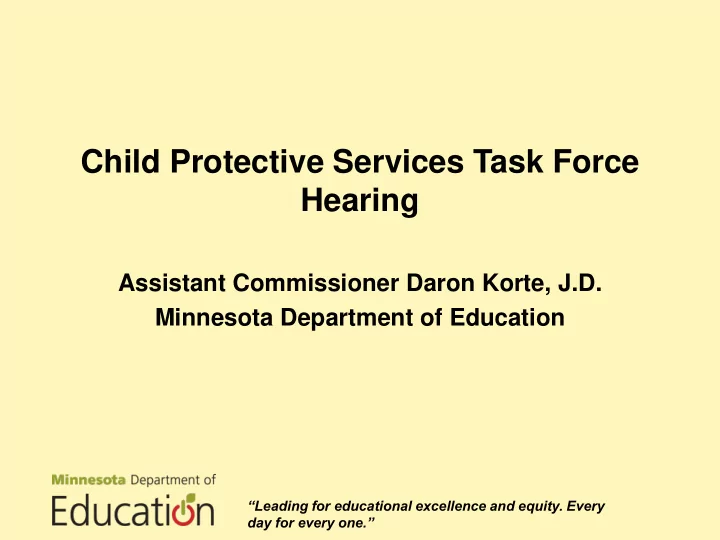

Child Protective Services Task Force Hearing Assistant Commissioner Daron Korte, J.D. Minnesota Department of Education “Leading for educational excellence and equity. Every day for every one.”
Agenda • Early Childhood – Child Abuse and Prevention Act (CAPTA) and Individuals with Disabilities Education Act (IDEA) • Student Maltreatment • Students in Foster Care education.state.mn.us 2
IDEA and CAPTA • Individuals With Disabilities Education Act (IDEA) Part C – Federal law that serves infants and toddlers with developmental delays, diagnosed medical conditions, or who are at risk of developing delays due to a diagnosed medical condition. • Child Abuse and Prevention Act (CAPTA) – a federal law that requires any child under the age of three who is the victim of a substantiated case of abuse or neglect be referred to Part C intervention. • Traditional Investigation vs. Family Assessment education.state.mn.us 3
Expanded CAPTA Policy • MDE and DHS expanded policy to ensure that more children who have experienced abuse and neglect, either directly or observed, get rapid and ongoing developmental monitoring and screening. • If a child under 3 has substantiated case, a record of Part C referral in DHS’ Social Services Information System (SSIS) is required before a case can be closed. – Ensures no children eligible for referral slip through. education.state.mn.us 4
Expanded CAPTA policy (cont.) • If there is a substantiated case on a child over the age of 3 but there is a child under the age of three in the home, it is strongly recommended that the child under the age of three be referred to infant and toddler intervention. • Wellbeing of the child is paramount – Parents must be made aware of the referral for Part C service but consent is not required. – However, any further action after referral requires consent of the parent or guardian. education.state.mn.us 5
Additional Early Childhood Interagency Efforts with DHS • Governor’s Interagency Coordinating Council (ICC) • Interagency Early Intervention Committees (IEICs) – Representatives of county human services – Charged with making concerted efforts to reach out to hard to serve populations. • Participation by MDE ECSE staff on other DHS Initiatives. education.state.mn.us 6
Student Maltreatment Program • 1999 – Legislature amended MN Stat. 626.556 to give Minnesota Department of Education (MDE) authority to investigate reports of alleged maltreatment of students in Minnesota public schools Minn. Stat. 626.556 Subd. 3b. education.state.mn.us 7
Impact of 2015 Legislative Amendments on Student Maltreatment Program Current Impact – Emphasis on the overall health and safety of children in school settings. – An increase in collaboration with law enforcement due to the clarification of cross reporting requirements. Projected Impact – An increase in assigned investigations due to changes in statutory definitions related to physical abuse. – Over the past two fiscal years our program has experienced a 45% increase in maltreatment reports. We anticipate that the changes in legislation will lead to an even greater rate of increase in intake reports. education.state.mn.us 8
Additional Child Protection Relationships Between DHS and MDE • MDE cross reports allegations of child maltreatment that are outside MDE’s jurisdiction to DHS and local county welfare agencies and visa versa. • MDE participates on the Seven Metro County Child Protection Screeners Committee. • MDE participates on the DHS Child Mortality Review Panel • MDE has hosted student maltreatment stakeholder meetings in which DHS has participated. education.state.mn.us 9
Students in Foster Care • Children in foster care can be found in all areas of education – general education, special education, alternative programs, gifted programs, etc. • Services need to be tailored to the individual needs of the student. • Much of the work with children in foster care and school placement occurs at the local/regional level. – Communication is key
Continued Enrollment for Students Placed In Foster Care • “[A] pupil who has been enrolled in a district who is placed in foster care in another district may continue to enroll in the prior district without the approval of the board of the prior district .” – Minn. Stat. 2015 § 124D.08 Subd. 2b
Foster Care and Special Education • Initiatives that support children who are in special education and who may be in foster care: – Interagency Coordination – Mental Health Initiatives in schools – Targeted efforts to support school success
Foster Care and Special Education Interagency Coordination – Minnesota State Interagency Committee (MnSIC) State agencies, schools, counties, parents, and others Goal is to support coordination and eliminate silos – Local Collaboratives Community Interagency Transition Committees Mental Health and Family Services Collaborative Individualized Educational Program (IEP) Teams
Foster Care and Special Education Mental Health Initiatives in schools – School Linked Mental Health Grants – Children’s Therapeutic Services and Supports (CTSS) Keeping Students in the Classroom – Alternatives to Suspension Grants – Reintegration Protocol – Positive Behavioral Interventions and Supports Alternative Delivery of Specialized Instructional Services (ADSIS)
Other Child Wellbeing Partnerships With DHS and Other Agencies • Minnesota System of Interagency Coordination • Minnesota’s Olmstead Plan – Goals include interagency coordination between MDE and DHS, DEED, and DOC. • Children’s Cabinet – Commissioners of DHS, MDH, MDE
Questions? • Assistant Commissioner Daron Korte, J.D. – Phone: (651) 582-8216 – Email: daron.korte@state.mn.us • Adosh Unni, J.D. – Government Relations Director – Phone: (651) 582-8292 – Email: adosh.unni@state.mn.us • MDE Website: education.state.mn.us education.state.mn.us 16
Recommend
More recommend